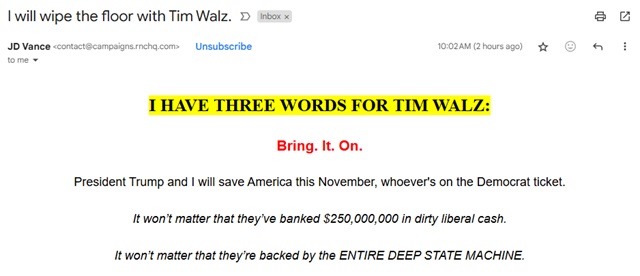Hours after it was reported that Democratic presidential nominee Kamala Harris had chosen Minnesota Governor Tim Walz as her running mate, Donald Trump‘s running mate J.D. Vance slammed Walz in a campaign email boldly entitled: “I will wipe the floor with Tim Walz.”
Inside the pitch, which was signed by Vance and sent by the Republican National Committee, Vance vowed that he and Trump “will save America” and that his pugilistic “three words for Walz” were the bravado-laden: “Bring. It. On.”

Using a populist rallying cry, Vance, a United States Senator running with a former President, claimed that the Harris-Vance ticket is backed by the “Deep State Machine.”
Vance also referred to the fundraising windfall that followed Harris’s ascension to the top of the Democratic ticket as $250 million of “dirty liberal cash.”
Vance and Walz, both Midwesterners, will likely have a Vice Presidential debate in the fall, when Vance’s assertion that he will “wipe the floor” with Walz will be tested.
Vance appears extra-motivated because of Walz’s viral success in portraying Vance and Trump — but especially Vance — as “weird.”
NOTE: Campaign emails practice a particularly heightened form of hyperbole. Their messaging targets a captive and receptive audience — people who have willingly signed up for the list — and so campaign emails tend to exhibit unadulterated partisanship.
“Give the people what they want” goes the old adage, and in the case of campaign emails, political boosters know their audience precisely and know specifically what they want to hear.
The result is often rhetoric that tends to be more combative and insular than the language trotted out in less targeted communications — just as the language of campaign rallies differs from the language of TV interviews. Campaign emails aren’t trying to lure swing voters; the emails are sent — by both parties — to feed the confirmation bias of the captured voter and secure a financial contribution.
